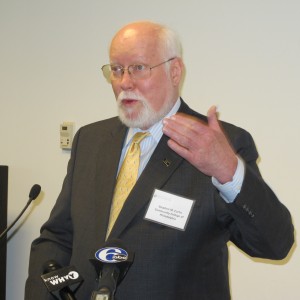Community College Faculty Angry Over New Marcellus Training Center

Community College of Philadelphia president Stephen Curtis speaks at the announcement of CCP's new "Energy Training Center."
Faculty at the Community College of Philadelphia say they were surprised to learn about plans to create the Energy Training Center aimed at connecting Philadelphians with Marcellus Shale related jobs.
“I’ve just been flabbergasted,” said Miles Grosbard, professor of architecture and chair of the department of architecture design and construction at CCP.
Grosbard, who has been developing energy related curricula for the past several years at CCP, says nobody from the college contacted him about the plan. He stumbled upon the press event earlier this month by accident.
“You can’t just throw together an energy training center by administrative fiat,” Grosbard told StateImpact. “It’s a big endeavor.”
But CCP president Stephen Curtis says there will be no new building, and no new curricula. The effort is to package the programs that CCP already offers, and gear them toward regional jobs related to the Marcellus Shale industry.
“We’re trying to make more visible the opportunities in the energy industry,” says Curtis. “That includes gas, water, renewable energy, electricity, these are things we’ve been doing all along.”
At the announcement, president Stephen Curtis stood with Department of Labor and Industry Secretary Julia Hearthway, and representatives of the Marcellus Shale Coalition, an industry group. Hearthway said industry jobs in the area were going unfilled due to a lack of skills.
“Philadelphia is ideally suited to have that job opportunity, to have that job growth, in this area as long as there’s a trained workforce to fulfill it,” said Hearthway at the event.
Sue Mukherjee, from the Pennsylvania Department of Labor and Industry, told StateImpact that the training center would focus on the shale supply chain.
“Whether you are trying to be a drafter, whether you are trying to get into architecture,” said Mukherjee, “these are all some of the fundamental base supply chain occupations that are not restricted to the core areas where the drilling is going on.”

Mukherjee pointed to the need for civil engineering technicians, who she said could make $22 dollars an hour assisting civil engineers.
Grosbard says he’s puzzled why he wasn’t told about the plan.
Curtis praised Grosbard’s efforts at developing the College’s energy conservation degree program. He says faculty would be involved if any new credit-based curricula is developed.
“We would never move forward on the credit side without faculty,” Curtis said. “We would never dream of that.”
Other faculty are uneasy about the school making a connection with the Marcellus Shale industry. Margaret Stephens is an associate professor in social science, environmental conservation and geography.
“Clearly there’s substantial evidence of physical and environmental public health concerns relating to the fracking operations in their totality,” said Stephens. And we’re very concerned about involving our students in that industry.”
CCP president Curtis says the training would not involve direct gas drilling jobs. Rather, the goal is to fill jobs in the Philadelphia area.
“Right now we’re trying to do things that will help put people in jobs,” says Curtis.
Professor Stephens says she plans to bring it up at the faculty union meeting next week, and call for a resolution to halt the program.
















